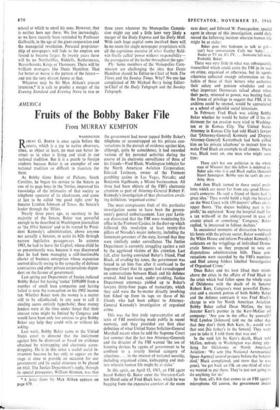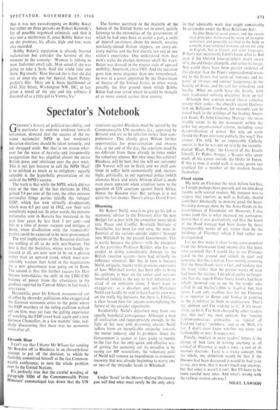Fruits of the Bobby Baker File
AMERICA
From MURRAY KEMPTON
WASHINGTON
ROBERT G. BAKER is once again before the courts, which is a joy to native observers, since, as object at least, no man can better in- struct us in what is living and vivid in our national tradition. But it is a puzzle to foreign students because Baker is an exemplar of our national tradition so difficult to translate for them.
As Bobby Gene Baker of Pickens, South Carolina, he began his service to the Senate as one of its page boys in the 'forties, improved his knowledge of the intimacies of that society as telephone operator of its cloakroom, and came at last to be called `my good right arm' by Senator Lyndon Johnson of Texas, the Senate's leader through the 'fifties.
Nearly three years ago, as secretary to the majority of the Senate, Baker was powerful enough to be described in Washington journalism as `the 101st Senator' and to be trusted by Presi- dent Kennedy's administration, above anyone not actually a Senator, to assist its bills through narrow legislative passageways. In autumn 1963, he had to leave the Capitol, whose child he so pre-eminently was, because it was discovered that he had been managing a still-inestimable cluster of business enterprises whose expansion seemed directly owing to the sympathy of defence contractors and other private corporations depen- dent on the favour of government.
Last spring our Department of Justice indicted Bobby Baker for having `stolen' $100,000 from a number of small loan companies and having failed to note the transaction on his 1962 income tax. Whether Baker took the money is a matter still to be adjudicated; in any case to call it stealing seems entirely hyperbolic; these money lenders were at the time under threat that their interest rates might be limited by Congress and would have been only too anxious to give Bobby Baker any help they could with or without his asking.
Last week, Bobby Baker came to the United States court to demand that the indictment against him be dismissed as based on evidence obtained by wiretapping and electronic eaves- dropping. He is in this sense a useful social in- strument because he has only to appear on the stage at once to provide an occasion for our government and its social structure to be placed on trial. The Justice Department's reply, through its special prosecutor, William Bittman, was that * A letter from Sir Max Aitken appears on page 679.. the government had never tapped Bobby Baker's telephone or eavesdropped on his private con- versations in the pursuit of evidence against him, although, quite by coincidence, it had recorded various of his personal activities during the course of its electronic surveillance of three of his friends—Fred Black, Washington lobbyist for the North American Aviation Corporation; Edward Levinson, owner of the Fremont gambling casino in Las Vegas, Nevada; and Benjamin Sigelbaum, a Miami businessman. All three had been objects of the FBI's electronic attention as part of Attorney-General Robert F. Kennedy's investigation of that abstraction await- ing definition, `organised crime.'
The most conspicuous fruit of this particular investigation seems to have been the govern- ment's general embarrassment. Last year Levin- son discovered that the FBI were monitoring his office in the Fremont Casino; in the dust-up which followed this revelation at least twenty-five pillars of Nevada's major industry, including the lieutenant-governor of the state, learned that they were similarly under surveillance. The Justice Department is currently struggling against a suit by the aggrieved victims of this attention. Last fall, after having convicted Baker's friend, Fred Black, of evading his taxes, the government was forced to set him free after it confessed to the Supreme Court' that its agents had eavesdropped on conversations between Black and his defence counsel. And last week, under prodding, Justice Department attorneys yielded up to Baker's lawyers thirty-four pages of transcripts, which they said were the by-matter directly involving him fished up from its taps on those of his friends who had been subject to Attorney- General Kennedy's investigation of organised crime.
This was the first truly representative set of texts of FBI monitoring made public in recent memory, and they provided our first clear definition of what United States Solicitor-General Marshall meant when he told the Supreme Court last summer that the last two Attorney-Generals and the director of the FBI wanted `the use of listening devices by agents of government to be confined to a strictly limited category of situations . . . in the interest of national security, including organised crime, kidnapping and mat- ters wherein human life might be at stake.'
In this spirit, on April 15, 1963, an FBI agent heard Robert G. Baker enter the Sheraton-Carl- ton Hotel suite of Fred Black here, which he was bugging from the expensive comfort of the room next door; and Edward W. Pennypacker, special agent in charge of this investigation, could duly record the following incident wherein human life might be at stake: Baker goes into bedroom to talk to girl— can't bear conversation. Calls her 'baby.'. . . Radio or TV on. It's TV.... Someone left suite. Probably Baker.
There was very little in what was subsequently transcribed which could assist the FBI in its war on crime, organised or otherwise, but its agents otherwise collected enough information on the habits of those of their betters who authorise their salary and pension schedules and on what important Democrats talked about when their party, returned to power, was beating back the forces of privilege to suggest that FBI, if its archives could be opened, would be appreciated as a school of splendid social historians.
In February Fred Black was asking Bobby Baker whether he would be better off if his in- dictment for tax evasion were tried in Washing- ton or in Kansas City. The United States Attorney in Kansas City had told Black's lawyer that lAttorney-General] Kennedy and [Deputy Attorney-General] Katzenbach had both called him on his private telephone' to instruct him to make Fred Black an example to all sinners. There was, Black went on, one man who might save him: There ain't but one politician in the whole state of Missouri that this fellow is indebted to. Baker asks who it is and Black replies (Senator) Stuart Symington. Bobby says he can't do any- thing there.
And then Black turned to those social prob- lems which are never far from any good Dernc crat's concerns. He said a friend of theirs had 'a great idea.' They would build a high rise hospital on the West Coast with 150 doctors' offices on its upper floors. The doctor building part is for profit,' he explained. `Keep the hospital itself for a tax write-off in the underground in case of atomic attack or something.' Congress,' Baker replied, `is interested in fallout shelters.'
In occasional moments of distraction between his bouts with the private sector, Baker would call the White House and inform President Kennedy's assistants on the wrigglings of individual Demo- cratic Senators as they prepared to vote on disputatious administration bills. These con- versations were recorded by the FBI's monitors and filed among folders labelled `Investigation of Organised Crime.'
Once Baker and his host lifted their minds above the crisis in the affairs of Fred Black to the crisis which bad fallen upon the whole state of Oklahoma with the death of its Senator Robert Kerr, Congress's most powerful Demo- crat and a staunch patron of both Bobby Baker and the defence contracts it was Fred Black's charge to win for North American Aviation. Bobby Baker called Dean McGee, the late Senator Kerr's partner in the Kerr-McGee oil company: 'Are you in the office by yourself? Well Lyndon [Johnson] told me the other day that they don't think Bob Kerr, Jr., would win that seat [his father's in the Senate]. They want you to take it. I told them that was out' In the void left by Kerr's death, Black told McGee, nobody in Washington was doing any- thing for Oklahoma or North American Aviation: 'We sent [the National Aeronautical Space Agency] several projects before the Senator died,' Black complained, and (now that he was gone), 'we got back an OK on one-third of what we wanted to put there. They're just not going to do anything for us.'
So then, all's fish that comes to an FBI agent's microphone. Of course, the government insists that it was not eavesdropping on Bobby Baker but rather on three persons on Robert Kennedy's list of possible organised criminals and that it was just a misfortune if, since Bobby Baker was on the premises, his affairs, high and low, were also recorded.
Bobby Baker's reputation is already beyond reclamation but consider the heroine of this moment in the comedy: 'Woman is talking to man. Indistinct small talk. Man asked if she was going to take a bath. Said she could take one there. Big towels.' How blessed she is that she did not at once cry out for Special Agent Penny- packer's file: 'Here am I, Susie Spellbound of 6343 31st Street, Washington NW, DC, at last given a towel of the size and the softness I dreamed of as a little girl in Vienna, Va.' The former secretary to the majority of the Senate of the United States sat in court, quietly listening to the enormities of the government of which he had once been so useful a part, a smile of injured awareness about his mouth, wearing not-lately-shined Italian slippers, an ivory-on- ivory necktie and the first electric tan suit in one visitor's experience. One understood then that men's styles do change, however small the ways; Baker was dressed in the precise style of upward mobility, American, circa 1963. And the occasion gave him more elegance than one remembered; he was in a court appointed by the Department of Justice of the United States, in other words possibly the first ground upon which Bobby Baker had ever stood where he could be thought of as more sinned against than sinning.















































 Previous page
Previous page